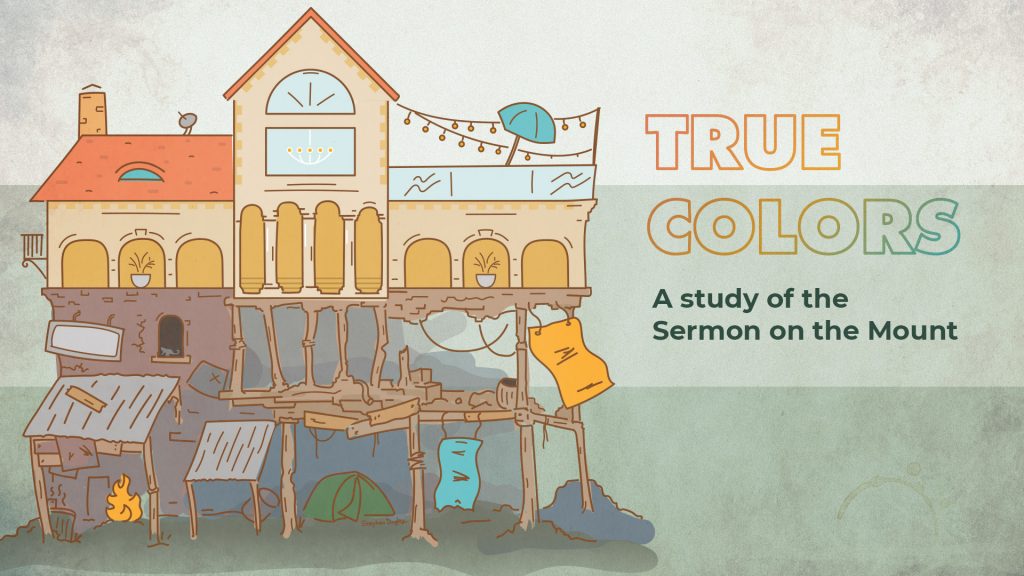Passage: Matthew 5:48-6:6; 6:16-18
Guide for Group Discussion or Personal Reflection
Sermon Summary
In Matthew 5:48, Jesus says that we must be “perfect”—literally whole, or complete—“as our heavenly Father is perfect”. In many ways, this is the unifying theme of the Sermon on the Mount. Jesus is seeking disciples whose lives are “whole”—whose deeds match their words, whose private actions match their public actions—people with a unified desire to express and extend God’s kingdom in all their lives.
In the first part of Matthew 6, Jesus warns against a lack of integrity or wholeness in our religious practices. Though many people “practice their righteousness before others in order to be seen by them” (6:1), it is gravely dangerous to do so. Such people appear close to God, but in reality are like actors, hypocrites who are actually far from him…and it’s easy to fool ourselves! The witness of the church also suffers as well because people can often sense when Christians are outwardly religious but haven’t truly been transformed. When we recognize the level of transformation that Jesus wants to bring about in us, we will realize how deeply we need to repent—not only of the bad things we have done, but of the bad motives behind even the good things we’ve done.
In each example Jesus gives (giving, praying, fasting), however, he also shows a better, truer way to practice righteousness. Practicing true righteousness is not about becoming invisible, or about doing things without seeking a reward, but rather about seeking the reward of pleasing our Father in heaven, who “sees in secret”, and who is delighted in us. Only when we live for his praise and approval can we be free from living for the praise and approval of others. This is the ultimate reward.
Sermon Outline:
• The Danger of Practicing Righteousness Before Others (5:48-6:2; 6:5; 6:7; 6:16)
• The Healing of Our Righteousness (6:3-4; 6:6; 6:17)
Group Discussion & Personal Reflection Guide
Re-read the passage(s): Matthew 5:48-6:6; 6:16-18
The Danger of Practicing Righteousness Before Others (5:48-6:2; 6:5; 6:7; 6:16)
1) Re-read Matthew 6:1-2, 6:5, and 6:16. Why are the people in these warnings described as “hypocrites”? What was hypocritical about their lives? What was their motive and what was their reward?
2) It can be hard to discern when we ourselves are “practicing our righteousness before other people in order to be seen by them” (6:1). Why do you think it is so hard to detect this tendency in ourselves? What are some warning signs that your religious practice is starting to become driven by the approval and praise of others? How can you begin to discern this more quickly, and repent of it?
3) In the sermon, Pastor Bobby said that “religious people repent only of their bad deeds…non-religious people don’t worry about repenting at all…but Christians repent both of their bad deeds and the bad reasons behind all of their good deeds”. When was the last time you found yourself repenting of the “bad reason behind your good deeds”? What was the situation, and what did it teach you about yourself?
The Healing of Our Righteousness (6:3-4; 6:6; 6:17)
4) Re-read Matthew 6:3-4. What does it mean to “not let your left hand know what your right hand is doing?” What does this look like in practice?
5) Re-read Matthew 6:3-4; 6:6; 6:17-18. What patterns do you see emerge? What is Jesus commanding his disciples to do, when practicing their righteousness?
6) In the sermon, Pastor Bobby made the point that Jesus never counseled us not to seek any reward, but to “relocate what the reward is that we’re truly seeking”. What difference would it make it your motivation if you focused on seeking the right reward—pleasing our heavenly father—rather than seeking no reward at all?
7) What differences would it make in your life if you more deeply believed that your heavenly Father “sees you in secret” and is pleased with you? Try to be specific.
Additional Application Questions
Q) How else would you like to engage with God this week?
Q) How can you tangibly care for those in your community this week, both inside and outside of the church?
Prayer
Spend time praying for yourselves, our church community, the North Shore community, and our nation and world—particularly those most vulnerable.

